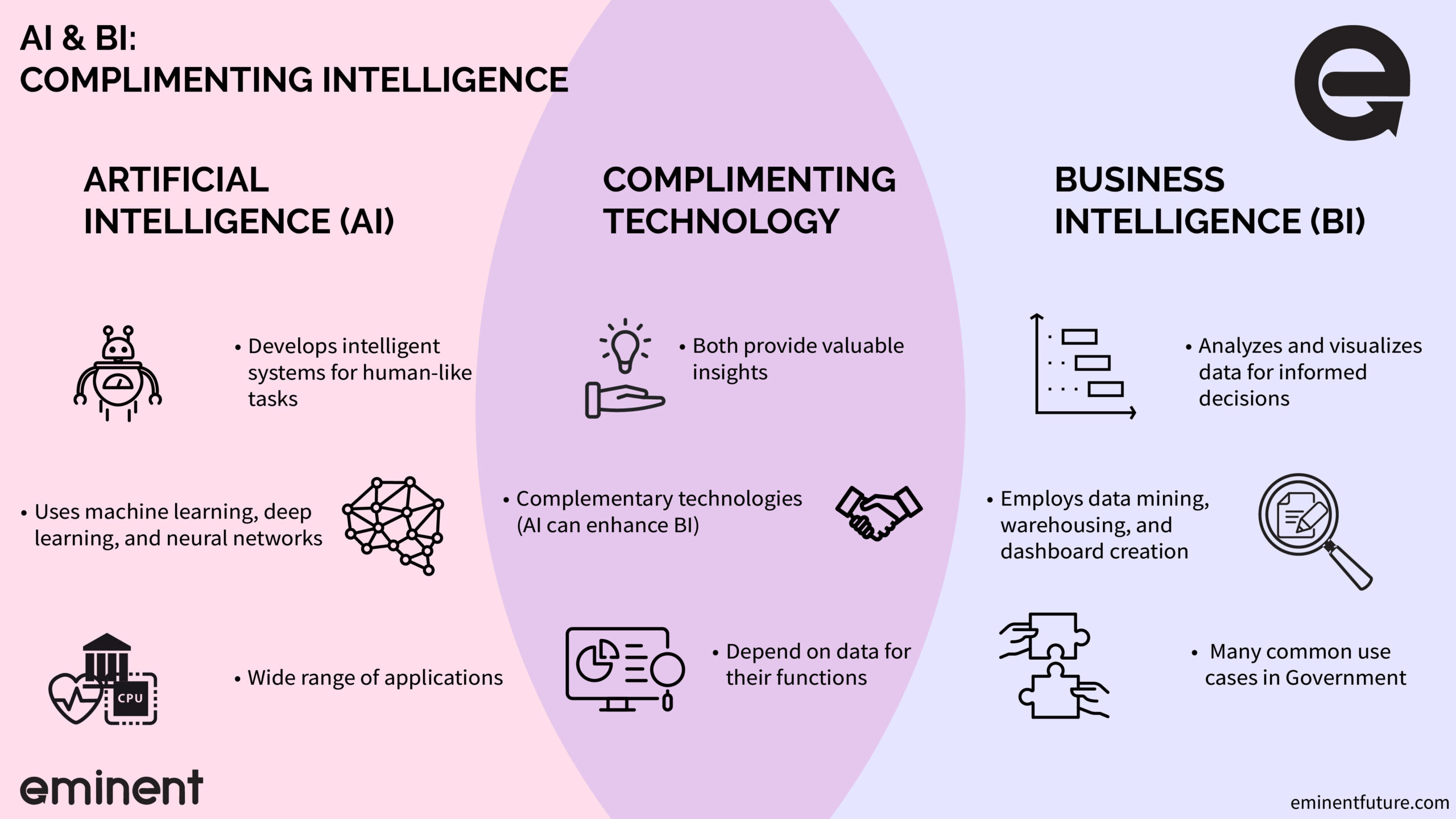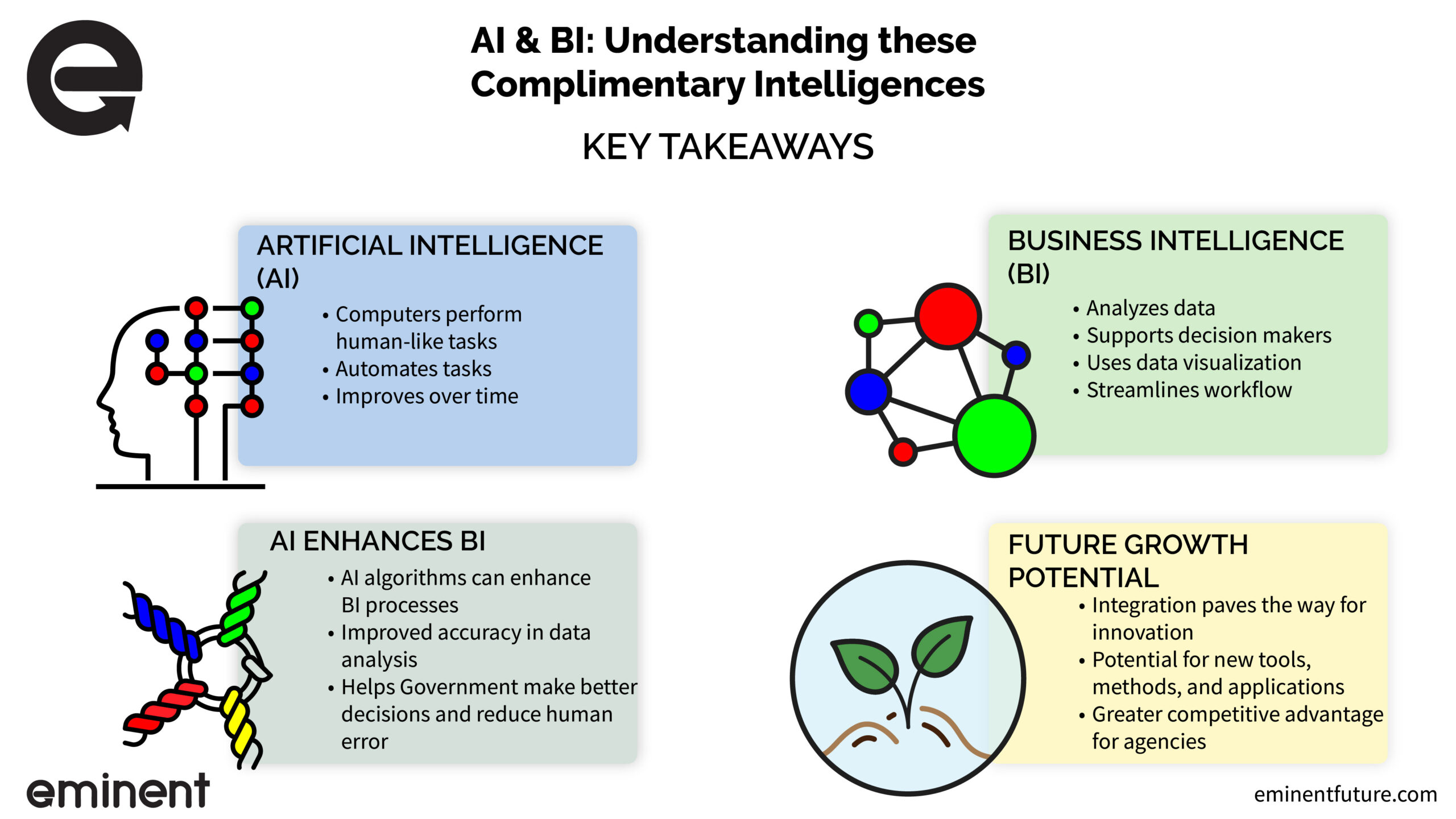Foundational Concepts: AI and BI in Federal Agencies

The world of data-driven decision-making has seen rapid advancements in recent years, with Artificial Intelligence (AI) and Business Intelligence (BI) emerging as critical tools for federal agencies. Although AI and BI share similarities, distinct differences influence how agencies will utilize the technologies.
This article will explore the fundamental differences between AI and BI, their unique benefits, and how federal agency directors can harness their combined power for more informed decision-making and improved outcomes.
Artificial Intelligence:
Beyond Data Analysis

Artificial Intelligence is a cutting-edge technology that enables machines to mimic human-like cognitive functions, such as learning, reasoning, problem-solving, and adapting. AI systems can process vast amounts of data, identify patterns and trends, and make predictions or recommendations based on their analysis.
Machine Learning (ML) and Deep Learning (DL) are subsets of AI that, through massive data analysis, expose critical areas for improvement within systems.
Critical Characteristics of AI
- Advanced pattern recognition
- Predictive analytics
- Automated decision-making
- Self-learning capabilities
Critical Characteristics of AI
- Improved decision-making through predictive analytics
- Automation of complex tasks, increasing efficiency
- Personalized user experiences for citizens and employees
- Enhanced security through threat detection and prevention
Business Intelligence:
Turning Data into Actionable Insights

Business Intelligence is a technology-driven process for analyzing structured and unstructured data and presenting actionable insights to help directors, managers, and other decision-makers make informed choices. BI involves collecting, processing, and analyzing data from various sources, visualizing the results, and generating reports or dashboards that provide valuable insights for decision-making.
Machine Learning (ML) and Deep Learning (DL) are subsets of AI that, through massive data analysis, expose critical areas for improvement within systems.
Critical Characteristics of BI:
- Data collection and processing
- Descriptive and diagnostic analytics
- Data visualization and reporting
- Supporting data-driven decision-making
Benefits of BI for Federal Agencies:
- Improved decision-making based on historical data analysis
- Enhanced data accessibility through dashboards and reports
- Better understanding of trends and performance indicators
- Increased efficiency through streamlined data processing
AI and BI:
Complementary Intelligence for Federal Agencies

While AI and BI have distinct differences, agencies can use these complementary technologies to maximize their benefits. By combining the advanced capabilities of AI with the insightful analysis of BI, agencies can gain a more comprehensive understanding of their data, empowering them to make smarter decisions and drive improved outcomes.
Leveraging AI and BI in Federal Agencies:
- Integrate AI and BI tools to create a unified data analytics platform
- Use AI-driven predictive analytics to inform strategic planning and resource allocation
- Implement BI dashboards and reports for real-time monitoring of performance indicators
- Combine AI automation capabilities with BI insights to optimize workflows and processes
Services Tailored for Federal Agencies:
AI and BI Solutions Providers

Several service providers specialize in AI and BI solutions designed to meet federal agencies’ unique needs and requirements. These providers understand federal organizations’ complexities and challenges, offering tailored solutions that comply with stringent security and regulatory standards.
AI Solutions Providers for Federal Agencies:
- IBM Watson: IBM offers a range of AI solutions under the Watson brand, including natural language processing, machine learning, and predictive analytics. These solutions can help federal agencies automate processes, improve decision-making, and enhance user experiences.
- Google Cloud AI: Google’s AI platform provides a suite of tools and services designed for federal agencies, including AI and ML algorithms, data analysis, and AI-based cybersecurity solutions. Google Cloud AI can help federal organizations harness the power of AI to optimize their operations and deliver better services.
BI Solutions Providers for Federal Agencies:
- Microsoft Power BI: Microsoft’s Power BI is a powerful business analytics service that enables federal agencies to analyze and visualize their data through interactive dashboards and reports. With built-in compliance and security features, Power BI can help federal organizations make data-driven decisions more efficiently.
- Tableau: Tableau is a popular BI and data visualization tool offering various solutions specifically designed for federal agencies. Tableau can help organizations analyze and present their data in a user-friendly format, allowing decision-makers to gain insights quickly and easily.
Partnering with Trusted Vendors for Federal Compliance

Federal agencies should actively seek out and partner with trusted AI and BI vendors that demonstrate compliance with federal regulations and security standards. This ensures the solutions implemented adhere to strict guidelines and protect sensitive information.
Selecting Customizable and Integrable Solutions
When choosing AI and BI solutions, it’s crucial for federal agencies to prioritize solutions that can be customized and easily integrated into their existing workflows and systems. This ensures seamless implementation, minimizing disruption and maximizing the utility of the new tools.
Ensuring Ongoing Support and Maintenance
Federal agencies must ensure that their chosen vendors provide ongoing support and maintenance for the AI and BI tools they implement. This guarantees continuous performance and helps maintain the security, reliability, and functionality of the solutions.
Investing in Training and Skill Development
Federal agencies must ensure that their chosen vendors provide ongoing support and maintenance for the AI and BI tools they implement. This guarantees continuous performance and helps maintain the security, reliability, and functionality of the solutions.
Conclusion
AI and BI are potent tools that offer unique benefits to federal agencies. By understanding their differences and harnessing their combined potential, agency directors can make more informed decisions, improve efficiency, and enhance the services they provide to their constituents.
Key Takeaways




